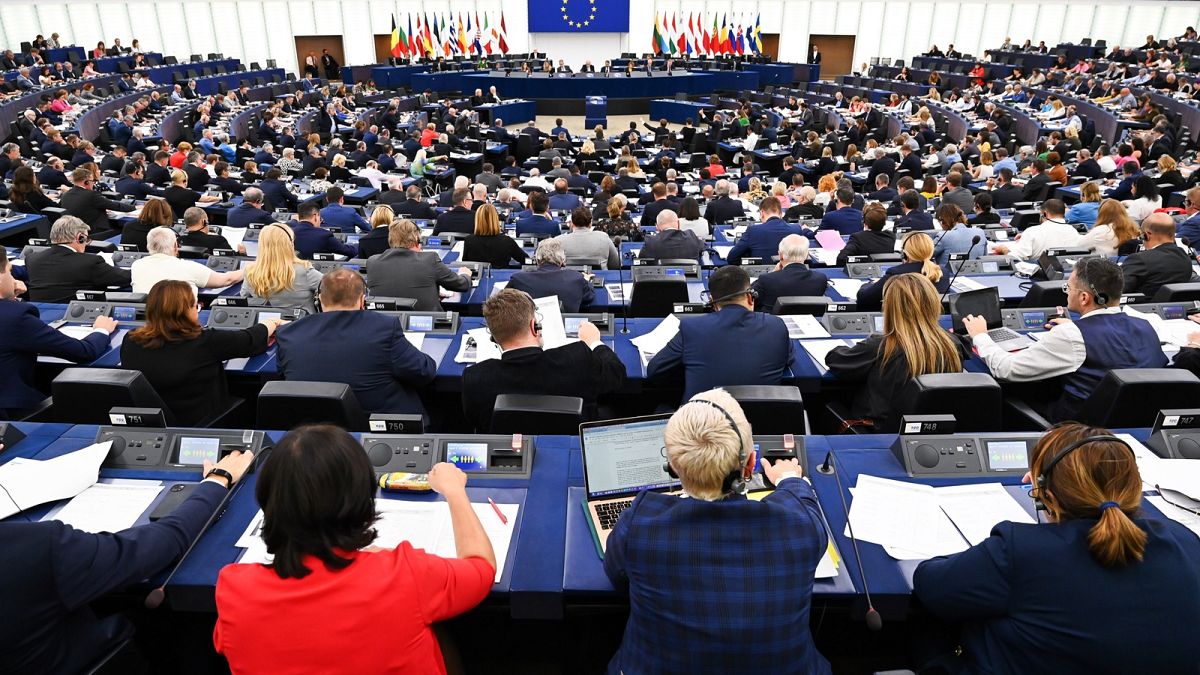風蕭蕭_Frank
以文會友歐洲議會議員在新報告中宣稱,匈牙利不再是一個完全的民主國家,而是一個“選舉專製國家”
作者:Jorge Liboreiro 和 Sandor Zsiros, 2022 年 9 月 15 日 - 2022 年 9 月 16 日更新
歐洲議會議員援引國際指數表示,匈牙利不能再被視為完全民主國家。歐洲議會議員認為,歐盟缺乏果斷行動導致匈牙利“民主、法治和基本權利崩潰”。
歐洲議會成員周四在一份不具約束力但極具象征意義的報告中宣布,匈牙利不再是一個功能齊全的民主國家。相反,該國應被視為“選舉專製的混合政權”,定期舉行選舉,但不尊重基本的民主規範。
立法者們表示:“專家們越來越一致地認為,匈牙利不再是一個民主國家。”他們援引了近年來降低匈牙利地位的一係列國際指數。
歐洲議會議員在決議中將矛頭直指自2010年以來一直執政的總理歐爾班·維克托,並譴責其政府“蓄意、係統地”破壞歐盟核心價值觀。
立法者對他們認為受到威脅的一長串基本權利表示擔憂,包括選舉製度、司法獨立、隱私、言論自由、媒體多元化、學術自由、LGBTIQ 權利以及對少數群體和尋求庇護者的保護。
歐洲議會議員還批評歐盟機構放任民主倒退。
臨時報告稱,議會“對歐盟缺乏果斷行動導致匈牙利民主、法治和基本權利崩潰,使該國變成選舉專製的混合政權深表遺憾”。
周四,該文本以 433 票讚成、123 票反對、28 票棄權的大幅優勢獲得通過。
該報告由與綠黨同席的法國歐洲議會議員格溫多琳·德爾博斯-科菲爾德 (Gwendoline Delbos-Corfield) 領導,審查了自 2018 年半周期觸發第七條程序以來匈牙利所發生的事態發展。
據信,這是歐盟機構首次宣布某個成員國不是適當的民主國家,而這是加入歐盟的必要先決條件。
“匈牙利的局勢急劇惡化,”投票前一天,德爾博斯-科菲爾德告訴歐洲新聞。 “我們到處都在退化,現在(這個國家)不再是一個民主國家。”
第七條被視為核選項,可以剝奪成員國在歐盟決策中的投票權,但需要理事會一致投票才能推進。另一個受第七條約束的國家波蘭已與匈牙利達成協議,以阻止對方的程序。
歐洲議會議員警告說:“任何進一步拖延此類行動都將構成安理會本身違反法治原則的行為。”
除了侵犯基本權利外,報告還表示,匈牙利針對腐敗、公共行政中的依附主義和裙帶關係以及公共采購方麵的缺陷采取的行動“有限”。
匈牙利總理維克托·歐爾班對此消息做出反應,表示他覺得這“很有趣”。
“我們不嘲笑它的唯一原因是我們對此感到厭倦。這是一個無聊的笑話,”報告獲得批準的第二天,歐爾班說道。 “這是他們第三次或第四次在歐洲議會通過譴責匈牙利的決議。起初,我們認為這很重要。但現在我們認為這是一個笑話。”
歐盟現金受到審查
匈牙利多年來一直受到布魯塞爾的嚴格審查。
歐盟委員會於四月推出了所謂的條件機製,這是一種新製度,當歐盟的金融利益可能受到威脅時,可以凍結一個國家在歐盟預算中的分配份額。
歐盟預算專員約翰內斯·哈恩 (Johannes Hahn) 提議,如果匈牙利政府未能采取必要措施加強民主標準並有效打擊腐敗,則削減匈牙利 70% 的資金。確切的百分比將於本周日得到確認。
匈牙利每年收到超過 60 億歐元的歐盟資金,其中大部分用於支持凝聚力項目。
除此之外,匈牙利仍然是唯一沒有批準 COVID-19 恢複計劃的成員國。委員會已要求進行改革,以換取綠色照明計劃,價值 58 億歐元的贈款。
隨著能源危機惡化和通貨膨脹飆升,布達佩斯已開始向布魯塞爾伸出援手,以釋放現金。本月早些時候,歐爾班總理簽署了一項法令,建立一個反腐敗機構,以及一個由政府和非政府代表組成的獨立工作組。
議會的報告u
Hungary is no longer a full democracy but an 'electoral autocracy,' MEPs declare in new report
By Jorge Liboreiro & Sandor Zsiros, 15/09/2022 - Updated 16/09/2022

Instead, the country should be considered a "hybrid regime of electoral autocracy" in which elections are regularly held but without respecting basic democratic norms.
"There is increasing consensus among experts that Hungary is no longer a democracy," the lawmakers said, citing a series of international indexes that have in recent years downgraded Hungary's status.
In their resolution, MEPs point the finger directly at Prime Minister Viktor Orbán, who has been in power since 2010, and condemn his government's "deliberate and systematic efforts" to undermine the EU's core values.
Lawmakers raise concerns about a long list of fundamental rights they believe to be under threat, including the electoral system, the independence of judiciary, privacy, freedom of expression, media pluralism, academic freedom, LGBTIQ rights and the protection of minorities and asylum seekers.
MEPs also criticised the EU institutions for allowing democratic backsliding to go unchecked.
The Parliament "expresses deep regret that the lack of decisive EU action has contributed to a breakdown in democracy, the rule of law and fundamental rights in Hungary, turning the country into a hybrid regime of electoral autocracy," the interim report reads.
The text passed by a wide margin on Thursday: 433 votes in favour, 123 against and 28 abstentions.
Led by Gwendoline Delbos-Corfield, a French MEP who sits with the Greens, the report examines the developments that have taken place in Hungary since the hemicycle triggered the Article 7 procedure in 2018.
This is believed to be the first time an EU institution declares a member state is not a proper democracy, an essential prerequisite to join the bloc.
"The situation in Hungary has dramatically degraded," Delbos-Corfield told Euronews the day before the vote. "Everywhere, we have degradation and it has become now that [the country] is no more a democracy."
Article 7, seen as the nuclear option, can deprive a member state of its voting rights in EU policy-making but requires a unanimity vote in the Council to move forward. Poland, another country subject to Article 7, has struck a deal with Hungary to block each other's procedure.
"Any further delay to such action would amount to a breach of the rule of law principle by the Council itself," MEPs warn.
Besides breaches of fundamental rights, the report also says there has been "limited" action against corruption in Hungary, clientelism and nepotism in public administration, as well as deficiencies in public procurement.
Reacting to the news, Hungary's Prime Minister Viktor Orbán said he found it "funny."
"The only reason we don’t laugh at it is because we’re bored of it. It's a boring joke," Orbán said a day after the report was approved. "It’s the third or fourth time they’ve passed a resolution condemning Hungary in the European Parliament. At first, we thought it was significant. But now we see it as a joke."
EU cash under scrutiny
Hungary has for years been under intensifying scrutiny from Brussels.
The European Commission launched in April the so-called conditionality mechanism, a new system that can freeze a country's allocated share of the EU budget when the bloc's financial interests are potentially endangered.
Johannes Hahn, the European Commissioner for budget, has proposed a 70% cut in Hungary's funding if the government fails to implement the necessary measures to strengthen democratic standards and effectively fight corruption. The exact percentage will be confirmed this Sunday.
Every year, Hungary receives over €6 billion in EU funds, most of which support cohesion projects.
In addition to this, Hungary remains the only member state without an approved COVID-19 recovery plan. The Commission has asked for reforms in exchange for green lighting the plan, worth €5.8 billion in grants.
As the energy crisis worsens and inflation soars, Budapest has begun making overtures to Brussels in a bid to release the cash. Prime Minister Orbán signed earlier this month a decree to establish an anti-corruption agency, together with a separate task force with both governmental and non-governmental delegates.
The Parliament's report urges the Commission to refrain from approving the recovery plan until all rule-of-law reforms are put in place and prevent funding for cohesion projects that might entail legal breaches.
"My recommendation [for the Commission] would be not to be fooled by pretended reforms," said Delbos-Corfield. "The Commission needs to be serious on the real changes we need."
But for Kinga Gál, a Hungarian MEP who belongs to the Fidesz party, the rhetoric expressed by the Parliament's report is not conducive to a resolution.
"What we see is that, while a constructive negotiation is going on between the European Commission and the Hungarian government, stigmatisation, incitement, and problem-making are taking place here [in the Parliament]," she told reporters in Strasbourg.
"Thank you very much: we do not ask for this dictation."
Gál's comments were echoed in a minority opinion attached at the end of the report and signed by a small group of far-right MEPs from Spain, France, Poland, Italy and Hungary.
"This text is yet another attempt by the federalist European political parties to attack Hungary and its Christian-democratic, conservative government for ideological reasons," they wrote.
You might also like
Centre-right leader Weber supports Macron's call for European nuclear deterrent
Poland's Tusk reshuffles cabinet to release ministers running in European elections
European Parliament Hungary rule of law Fidesz Democracy Viktor Orbán




